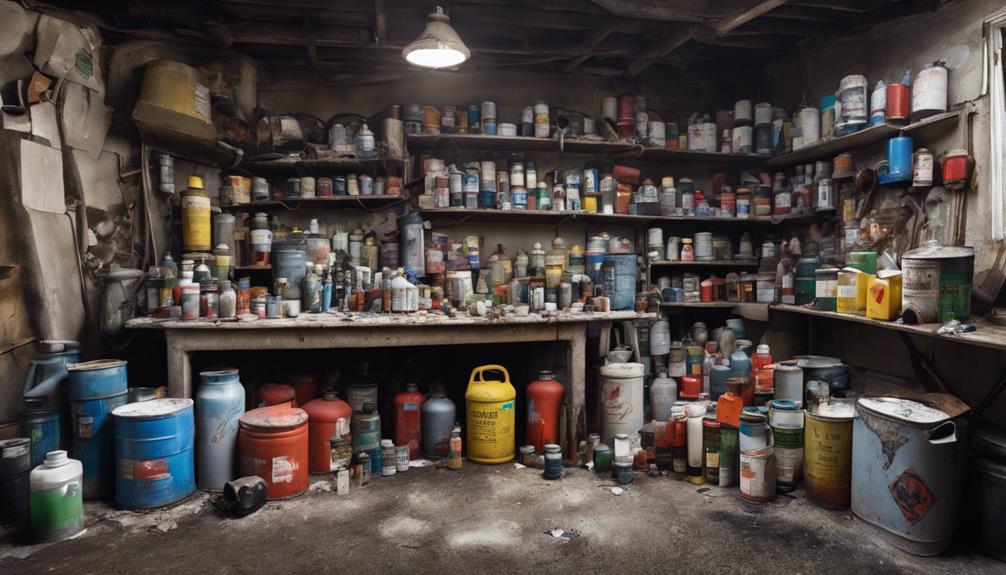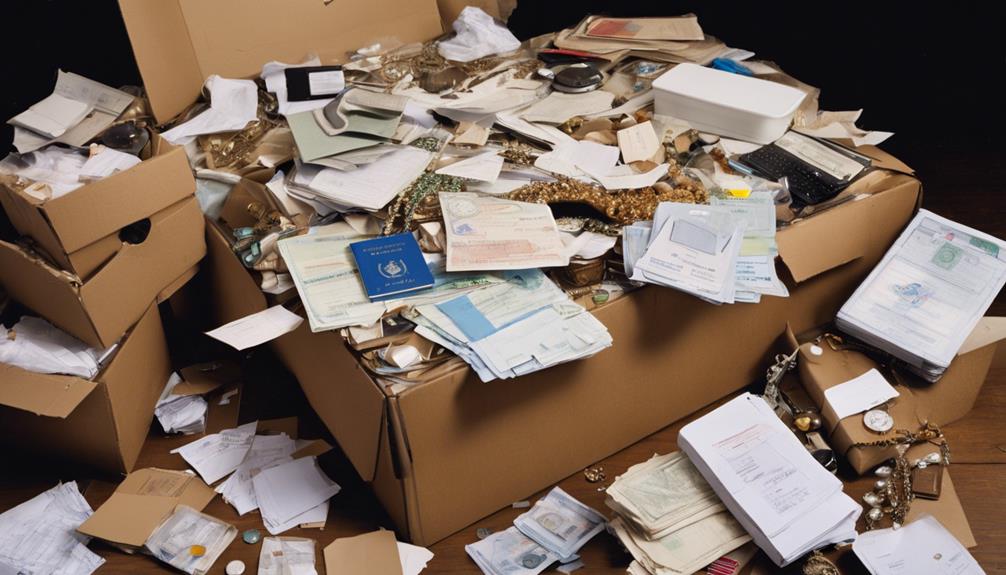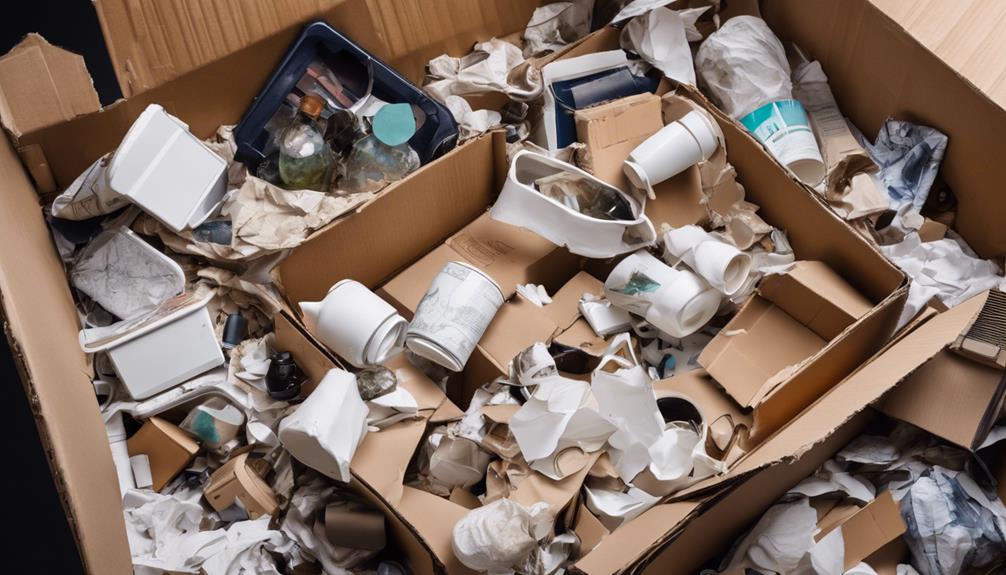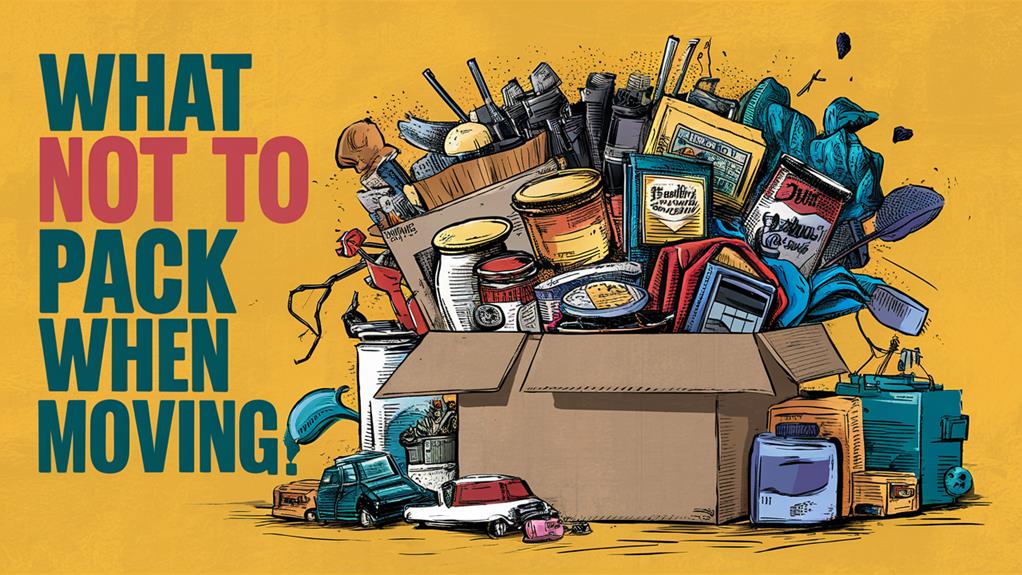When moving, avoid packing dangerous chemicals like cleaning products and flammable liquids, as they can leak or explode. Perishable food, including dairy and meat, is also a no-go since it can spoil and attract pests. Don't forget to transport valuables and important documents yourself to keep them safe, as movers often don't insure high-value items. Pets and large plants should be moved in your personal vehicle, and consider rehoming excessive plants. Lastly, assess broken or unused items; consider donating or discarding them to lighten your load. There's plenty more to consider to ensure a smooth move.
Dangerous Chemicals

When you're preparing for a move, it's crucial to keep dangerous chemicals off your packing list. Many moving companies prohibit hazardous materials, like flammable liquids and household cleaning products, because they pose serious risks.
Items such as gasoline, propane cylinders, paint thinners, and aerosol sprays can leak or even explode during transport, making safety a priority. Additionally, properly disposing of these materials contributes to reducing landfill waste and supports environmental efforts.
To ensure proper disposal of these dangerous chemicals, you should consult local regulations. Many municipalities have guidelines for safely disposing of hazardous waste, so it's essential to follow these rules to protect the environment and your community.
Instead of packing these materials in the moving truck, it's safer to keep them in your personal vehicle or dispose of them before the move.
Perishable Food
As moving day approaches, it's important to remember that perishable food items like dairy, meat, and fresh produce shouldn't be packed for the journey.
These items can spoil during transportation, creating unpleasant odors and attracting pests. Most moving companies even prohibit the transport of perishables due to these risks. To maintain cleanliness and avoid waste, it's best to consume or donate any excess food before moving day.
If you're moving locally, you might be able to transport a limited amount of perishable food, but make sure to check with your moving company first.
Proper insulation is key for keeping these items fresh during short trips. However, it's often easier and more responsible to donate your excess food to a local charity. Not only does this help reduce waste, but it also supports those in need in your community.
Valuables and Important Documents

Valuables and important documents require special attention during a move to ensure their safety and accessibility. You should always transport your valuables, like jewelry, heirlooms, and collectibles, personally. This approach guarantees their safe transportation and prevents loss or damage during the moving process.
Movers typically don't insure high-value items, so keeping them with you is crucial. Additionally, consider opting for moving insurance to cover any potential loss or damage to your belongings.
Important documents, including birth certificates, wills, and financial records, should be organized in a secure, easily accessible folder. This way, you can avoid misplacement during the transition.
Consider creating digital copies of these important documents as a backup. If something goes missing or gets damaged, you'll have a safety net.
Additionally, prioritize items with irreplaceable sentimental value, such as family photos. These should also be kept for personal transport to safeguard against potential disasters.
Using proper packing materials for any remaining items is essential, but remember that your most valuable belongings deserve your immediate attention.
Pets and Plants
Transporting pets and plants during a move requires careful planning and consideration. Whether you're making a long-distance move or a local move, it's important to ensure the safety and well-being of your furry friends and greenery. Here are some tips to keep in mind:
- Always transport pets in your personal vehicle with a crate or animal seatbelt; moving trucks can be unsafe. Ensuring a safe environment for your pets during transport is crucial, especially by following guidelines for travel arrangements to keep them comfortable.
- Consider rehoming or donating large plants that mightn't survive the journey.
- Check local regulations regarding transporting plants, as certain species may be prohibited across state lines.
- For local moves, securely pack indoor and outdoor plants, removing breakable pots to prevent damage.
When you're transporting your pets and plants, evaluate the space in your vehicle. Ensure you have enough room for everything, especially on cross-country moves.
This careful consideration can help prevent stress for both you and your beloved companions. Remember, the goal is to keep your pets comfortable and your plants healthy throughout the moving process.
Broken or Unused Items

What do you plan to do with broken or unused items before your move? It's essential to assess items carefully and avoid packing these unutilized items, as they can lead to clutter and potential damage during transport.
If an item is broken or unsalvageable, you should dispose of or recycle it. Moving these items will only increase your moving costs and complicate the process.
Look for unused items that are still in good condition. You can donate or sell these to help lighten your load. This not only reduces the number of belongings you need to pack but can also offset some of your moving expenses.
As you prepare for your move, create a realistic inventory of belongings. This will help you prioritize which items to keep and which to discard.
Items you haven't utilized in the past year should likely be considered for disposal, as they'll contribute to ongoing clutter in your new space.
Conclusion
When moving, it's crucial to know what not to pack to ensure a smooth transition. Avoid bringing dangerous chemicals, perishable food, and valuable items that could be lost or damaged. Don't forget to leave your pets and plants in safe hands, and skip any broken or unused items that won't serve a purpose in your new home. By following these guidelines, you'll simplify your move and make settling in much easier. Happy moving!
